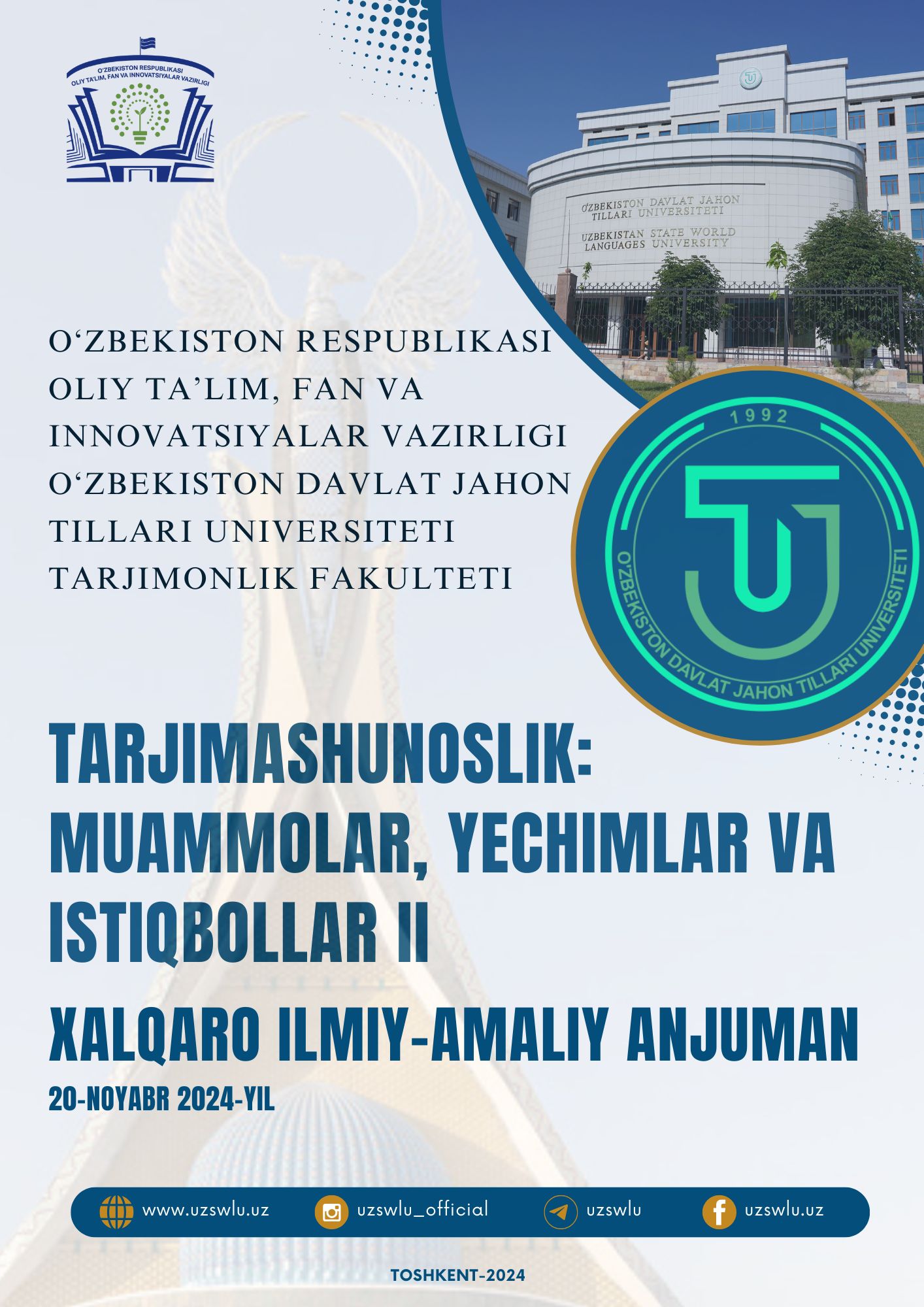THEORETICAL FOUNDATIONS OF ABSTRACT WORDS IN TRANSLATION
Kalit so‘zlar
Sensory grounding, embodied cognition, conceptual metaphor, con- ceptual approximation, explanatory expansion, contextual adaptation.Annotasiya
This article explores the challenges posed by the translation of abstract words, particularly focusing on how cultural, linguistic, and contextual differences influence meaning. Through theoretical analysis and case studies, it aims to uncover the nuances that often lead to mistranslations or shifts in meaning. The research will also propose strategies to improve the translation process, ensuring that these abstract concepts are conveyed with cultural and linguistic fidelity.
Foydalanilgan adabiyotlar ro‘yhati
Sequeira, D.L. (1994). Gifts of tongues and healing: The performance of charismatic renewal. Text and Performance Quarterly. Retrieved from Taylor & Francis
De Jager, E. (2019). An evaluation of speaking in tongues as angelic language from the Judaean and early Christian perspectives. Conspectus: The Journal of the South African Theological Seminary. Retrieved from Journals.co.za
Metcalf, C. (2015). The gods rich in praise: early Greek and Mesopotamian religious poetry. Retrieved from Google Books
Jakobson, R. (1966). Grammatical parallelism and its Russian facet. Language. Retrieved from JSTOR
Khasanova, F.M. (2023). Sociolinguistic features of the speech genre of prayer in the Uzbek language. International Journal Of Literature And Languages. Retrieved from Inlibrary.uz
D'Angelo, M.R. (1999). Intimating deity in the Gospel of John: Theological language and "Father" in "prayers of Jesus". Semeia. Retrieved from ProQuest
Van der Merwe, D.G. (2018). Prayer, the encounter and participation, the experience: A Pauline exhortation towards a spirituality of prayer. Verbum et Ecclesia. Retrieved from Journals.co.za
De Jong, A. (2007). Chapter Four. Liturgical Action From A Language Perspective About Performance And Performatives In Liturgy. Retrieved from Brill
Kostomarov, V.G., & Verescagin, E.M. (1975). Linguocultural Studies and the Linguocultural Dictionary. Slavic and East European Journal. Retrieved from JSTOR
Utegaliyeva, B.B., & Zhumabekova, G.B. (2023). Formation of Linguocultural Competence via the Case-Study Method. Retrieved from Bulletin-Pedagogical
Guliyants, A., Guliyants, S., & Ivanova, A. (2021). Textbooks on Foreign Literature as a Means of Students' Linguocultural Competence Building. Retrieved from Pensoft
Tashkuvatovich, K.L., & Yusufovna, K.N. (2022). Linguo-cultural Approach in Teaching a Foreign Language. Retrieved from Journal of Positive Psychology
Safonova, V.V. (2017). Cultural Studies as a Didactic Means of Improving Intercultural Language Education. European Journal of Language and Literature. Retrieved from Revistia
Strukova, A.A. (2019). Linguocultural Glossaries as a Tool of Developing Sociocultural Competence. Retrieved from Cyberleninka
Hasanova, S. (2014). Linguo-cultural aspect of interrelation of language and culture. Retrieved from Semantic Scholar
Yusupov, A. (2023). Methodology for the Analysis of Linguocultural Units in Mass Media Texts. Retrieved from Cyberleninka
Xinghua, W., Lingxia, M., & Xiuping, L. (2022). Cross-Cultural Research as a Methodological Resource of Modern Linguodidactics. Retrieved from Cyberleninka
Ge, Y. (2022). The linguocultural concept based on word frequency: correlation, differentiation, and cross-cultural comparison. Interdisciplinary Science Reviews. Retrieved from SAGE Journals
Zykova, I.V. (2016). Linguocultural studies of phraseologisms in Russia: past and present. Yearbook of Phraseology. Retrieved from De Gruyter
Sukhrob, S.S. (2024). Theoretical Approaches to the Study of Lingua-Cultures Based on Corpus Analysis. Retrieved from UMSIDA

